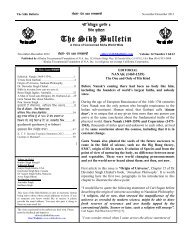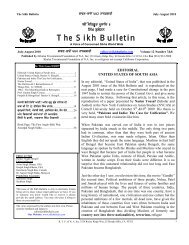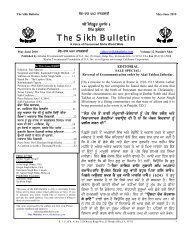Selected Editorials - The Sikh Bulletin
Selected Editorials - The Sikh Bulletin
Selected Editorials - The Sikh Bulletin
Create successful ePaper yourself
Turn your PDF publications into a flip-book with our unique Google optimized e-Paper software.
*****<br />
EDITORIAL<br />
PUNJABI & MONGOLIAN<br />
[Editorial from July-August 2008 <strong>Sikh</strong> <strong>Bulletin</strong>]<br />
Recent UNESCO report on languages concluded that languages of the world are disappearing at an<br />
alarming rate; “…most languages disappear because their speakers voluntarily abandon them”; and<br />
included Punjabi among them. That did not come as a surprise to me. Way back in 1960 I had travelled<br />
through Pakistan on my overland trip from New Delhi to Seattle, USA. Although everybody I came in<br />
contact with in Pakistan, from Lahore to the Iranian border, spoke beautiful Punjabi and only Punjabi,<br />
their official language was Urdu. Later when I visited Punjab (India) in 2001, after an absence of 25<br />
years, I had to ask myself why did <strong>Sikh</strong>s in Punjab agitate for Punjabi scuba if they were not going to use<br />
the language [See p. 2]. But just imagine my surprise as I turned to page 137 while recently reading<br />
“Marco Polo: From Venice to Xandau” by Laurence Bergreen.<br />
This was my surprise: An alphabet adopted by Kublai Khan in 1269 to be used for transcribing all the<br />
languages of his vast empire that extended from China Sea to the Caspian Sea was Punjabi. Arrangement<br />
of letters is top to bottom, unlike Gurmukhi script which is left to right, but sound sequence is the same<br />
except for the missing fourth consonant in each row. This alphabet was devised by a Tibetan monk,<br />
Matidhvaja Sribhadra, in Kublai Khan’s court at the latter’s request. It is obvious that the monk was<br />
well aware of the use of Gurmukhi script in Punjab. He did, however, adapt it for use for transcribing<br />
sounds specific to various languages in Kublai Khan’s empire. It is inconceivable that it is a mere<br />
coincidence. Relevant text from that book appears on page 2.<br />
Hardev Singh Shergill<br />
*****<br />
EDITORIAL<br />
SRI GURU GRANTH SAHIB<br />
Editorial from September-October 2008 <strong>Sikh</strong> <strong>Bulletin</strong>]<br />
It was on October 7, 1708 that Tenth Nanak bestowed the Guruship for the <strong>Sikh</strong>s upon Sri Guru Granth<br />
Sahib, thus making us the only people in the Orient the ‘People of the Book’; and the <strong>Sikh</strong>s all over the<br />
world are celebrating this 300 th anniversary of Gur Gaddi Divas.<br />
46
















